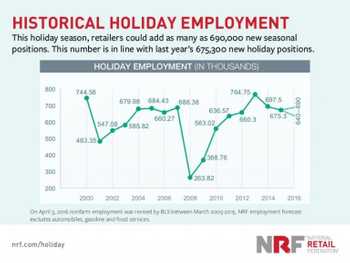For many companies throughout the world, the holiday employment season is coming soon. According to the National Retail Federation (NRF), U.S. retailers will hire nearly 700,000 seasonal workers this year. Temporary staffing specialists OfficeTeam recently released a study reporting that 25% of all companies increase their staff during the fourth quarter of the year. While these new hires address immediate and important customer needs, seasonal hiring comes with several risks which, according to Pinkerton’s Managing Director of Employment Screening, can be avoided or at least mitigated greatly.
Employee theft is the biggest threat
It will likely come as little surprise that the largest threat retailers and others face is theft. According to the NRF, retailers lost approximately $44 billion from theft in 2015. Of that amount, more than 34% was stolen by employees, the second leading cause of inventory shrinkage behind customer shoplifting. Whether on the sales floor, in a warehouse, driving a delivery truck or handling returns, employees have easy access to valuable inventory, creating temptations to steal.
A recent article by Women’s Wear Daily highlights the key issues involved in retail shrinkage, including employee theft, and how companies are using technology to combat the problem. We also published a blog post providing tips for preventing employee theft in retail. However, the Managing Director notes that employers could do more to prevent incidents of stealing if they followed the same hiring protocols that they do for full-time staff.

Check all employees equally
“Many times, employers will not screen seasonal workers the same way they do applicants for full-time positions, ” says the Managing Director. “This is a mistake. Companies should not compromise their employment policies just because the person may only be an employee for a short time. Many of the same risks exist no matter how long the person is employed.” Seasonal workers come in contact with customers, employees, and inventory in much the same way full-timers do. Access to employee and customer information, especially in today’s digital age, creates many possibilities that can be exploited by a seasonal worker who may have a history of criminal behavior that is not discovered with a pared-down background check.
There are several reasons why a company alters its screening process but one dominates all others. “Imagine an all-too-realistic scenario in which a company has hired a seasonal worker, didn’t do a full background check and an incident occurs that negatively impacts a customer. The resulting public relations situation could have a long-lasting effect, which might have been avoided with a more extensive review of the employee’s history.”
A penny saved is… not worth it
The main factor used by companies that choose to alter their background check efforts is weighing costs versus perceived benefits, according to the Managing Director. Companies are not willing to make the same investment in both time and resources to complete a comprehensive background check of a seasonal worker that they would with a full-time employee. “The thinking is that they will only be here for a few months so they don’t need to spend the same time and money they normally would. But that is putting employees and customers at risk. It creates the potential for a public relations situation that will damage the company’s reputation and brand. Is that worth it?”
What gets missed
Not completing a full background check can result in missing a lot of key information that could be seen as red flags. Many of those risks are the same as those we detailed in a recent post listing the Top 5 Errors with Corporate Background Checks. However, the short-cuts sometime used for seasonal employment checks create even more opportunities for people to get hired with questionable employment histories. The Managing Director says that companies will sometimes only look at criminal records for the county the applicant lives in now, ignoring past residential history.
“Each time a company runs a criminal background check, it costs money. So companies will only look for the record where the applicant lives now. We recommend a 7-year history check. But if the person has moved often, the costs can add up and companies are unwilling to make that investment.” Job applications require people to provide past employment information. Of course, companies aren’t required to verify that information and for seasonal workers, many times they don’t. “Companies will assume the worker is telling the truth or they just won’t take the time to check the information because the person will only work seasonally. So, while a few calls to past employers could reveal falsified information or the pattern of sub-par performance, if no one is checking, the applicant gets hired anyway.”
The holiday hiring season is very busy and everyone knows it…including applicants. “They know that companies will be hiring a lot of new workers, which means they will be looking at a lot of applicants. They will assume a thorough background check won’t be done so, they will apply knowing that they’ve had problems in the past and will figure that they will get hired anyway. Unfortunately, many times they are right.”
Seasonal employment can lead to full-time problems
Companies are always looking for good people and many times, they will find them during the seasonal hiring period. After the season is over, they will hire some of the temporary help as full-time employees. But if a full background screening wasn’t done when the person applied as a seasonal employee, it creates a problem, and a cost, for employers. If the full screening wasn’t done, the company may not remember to do a full check when the person is offered a full-time position. The result is that they will have an employee, or several, who have not gone through the same hiring process as their full-time staff. Unless the company has a system in place for when this situation occurs, it could wind up with a significant number of employees who were not screened properly.
Additionally, if the company does realize it needs to do a more complete screening before offering a full-time position, they are essentially allocating time and resources twice for the same applicant’s background screening. This duplication of efforts creates a cost and time expenditure that could have been avoided. —- The Managing Director says companies should give serious consideration to the risks involved in not following their normal hiring practices when it comes to season workers. “Customers and employees are what keep a company in business, ” says the Managing Director . “If you are not screening seasonal workers the same way you do full-time employees, you are putting people at risk while also risking financial losses from theft and other issues. That could really negatively impact your holiday season.”



